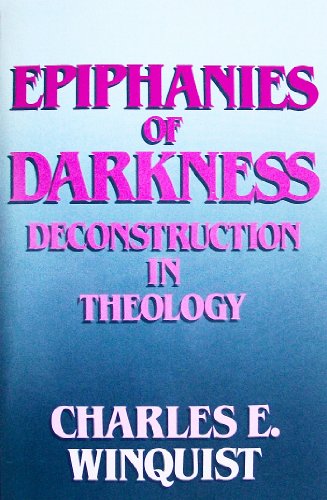Epiphanies of Darkness: Deconstruction in Theology - Softcover

"synopsis" may belong to another edition of this title.
Epiphanies of Darkness represents a searching and courageous appraisal of the state of theological discourse, as well as a powerfully constructive intervention into that discourse, with the aim of a completely reconstituting what we mean by theology. Winquist, and Mark C. Taylor are the two contemporary radical theologians engaged in truly creative and constructive work who are pressing the boundaries of what theology as a discipline is and can be, and who refuse to allow piety to pass for serious theological thinking. The major difference between the two is that while Taylor has taken his theological insights and applied them to various fields such as art, architecture, computer technology, advertising, media, and popular culture, Winquist has brought such interdisciplinary breadth and insights to bear intensively and insistently on theology itself.
Winquist is willing to risk all traditional self-understandings of theology in order to find it anew in strange and wonderfully different forms. Theology is set adrift from confessional chores, and is not primarily charged with defending unassailable church dogmas. Rather, theology deals with "ultimate concern" in a Tillichian sense. Theology is the reflexive discourse by which thinking human beings ask what really matters in their lives. Such a discourse is not a simple discourse, but immediately becomes implicated in a bewildering complexity, because only a complex and variegated thinking can possibly be adequate to the complexity of our experience and our lives. We live in the world as finite human beings, which is what Winquist calls the middle of experience. Our lives are irreducibly social, embodied, burdened, tragic, and filled with joy, and it is the empiricity of lived experience that Winquist never loses sight of even as he navigates through the thickets of abstract theories and formulations.
Thinking matters because it is the only way conscious human beings have of making sense of their lives and this thinking is in no way cut off from other aspects of experience, such as feeling, doing, loving, etc. Rather, our concepts of thought must be enlarged and enriched in order to take all of these phenomena into account. In fact, we are always already deeply engaged in life and experience whenever we are thinking, but conscious concepts must articulate the relationship between the ideas and the experiences because we never have simple access to the experiences themselves. That is, our immediate experience is always mediated by language, or some form of symbolic representation.
Winquist does not eliminate lived experience from linguistic reality, but he stresses that whenever we refer to our sensations, perceptions, or feelings, we are already caught up in a complex network of associations and references which imply more or other than the experience in itself. For Winquist, then, the way to value the experiences we have as well as the conscious thinking which reflects (on) them is not to simplify, purify or purge our concepts and images of their evident linguistic connotations. This strategy only lashes one even more surely to concepts, because an exclusive set of mediated concepts is then thought to provide immediate access to reality. The only way to truly honor the significance of our experiences is to amplify the associations and connections, and to allow our thinking to become as complex as possible. Rather than isolating itself in a world of mere ideas, this attitude allows reality to pressure and distort thinking and to make it truly creative. For Winquist, theology is ultimately about the creation of concepts with affective ties to experience, concepts that make a difference in human thinking and living.
"About this title" may belong to another edition of this title.
- PublisherFortress Press
- Publication date1986
- ISBN 10 080061903X
- ISBN 13 9780800619039
- BindingPaperback
- Number of pages130
Buy New
Learn more about this copy
Shipping:
US$ 4.13
Within U.S.A.
Top Search Results from the AbeBooks Marketplace
EPIPHANIES OF DARKNESS: DECONSTR
Book Description Condition: New. New. In shrink wrap. Looks like an interesting title! 0.35. Seller Inventory # Q-080061903X

